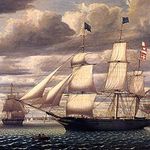China and Britain: War and Commerce in the Age of Opium
 DATE: Friday April 7, 2017 4:30-6:00 pm
DATE: Friday April 7, 2017 4:30-6:00 pm
LOCATION: 725 Commonwealth Avenue, CAS Building Room 313
Boston University New England Asia Seminar Series
Co-sponsored by the BU Pardee School of Global Studies Center for the Study of Asia and International History Institute
As part of this year’s events on ‘Asia in the World: Conflict and Engagement at Boston University, this panel presents ground-breaking research on the contacts and confrontation between China and Britain in the 19th century, and their significance for global history. The event is also part of the pedagogical curriculum of the History Seminars HI 482 (History of Maritime Asia) and HI 451 (Fashion as History).
Speakers
1) Professor Chen Song-chuan, History Division, Nanyang Technological University, will present his new book on the first opium war and the lobby of English merchants in China. Copies of the book will be available for purchase and signing at a discounted price.
Merchants of War and Peace: British Knowledge of China in the Making of the Opium War
Merchants of War and Peace challenges conventional arguments that the major driving forces of the First Opium War were the infamous opium smuggling trade, the defense of British national honor, and cultural conflicts between ‘progressive’ Britain and ‘backward’ China. Instead, it argues that the war was started by a group of British merchants in the Chinese port of Canton in the 1830s, known as the ‘Warlike Party’. Living in a period when British knowledge of China was growing rapidly, the Warlike Party came to understand China’s weakness and its members returned to London to lobby for intervention until war broke out in 1839. However, the Warlike Party did not get its way entirely. Another group of British merchants known in Canton as the ‘Pacific Party’ opposed the war. In Britain, the anti-war movement gave the conflict its infamous name, the ‘Opium War’, which has stuck ever since. Using materials housed in the National Archives, UK, the First Historical Archives of China, the National Palace Museum, the British Library, SOAS Library, and Cambridge University Library, this meticulously researched and lucid volume is a new history of the cause of the First Opium War.
2) Dr. Rachel Silberstein, Luce / ACLS Postdoctoral Fellow, Department of History of Art and Visual Culture, Rhode Island School of Design.
“A Vent for our English Woollen Manufacture”: Marketing Foreign Fabrics in Nineteenth-Century China
Contrary to the established narrative of the Qing as conservative eschewers of all things foreign, recent studies have drawn attention to the increasing presence and popularity of foreign objects from the late Ming period onwards, something that gained momentum with the arrival of the East India Company in the late seventeenth-century. This paper provides a micro-history of the most critical component of the EIC trade, woollen fabrics. Oft-dismissed by economic historians, new data compilations permit unprecedented analysis of this trade, which despite numerous challenges, was to become increasingly important, both to the EIC and British woollen manufacturers. By charting the EIC’s various attempts to market their wares and counter the competition, particularly Russian competition for the northern markets, this presentation explores how British woollens entered Chinese society and argues for a new perspective on the trade wars of the early nineteenth-century that acknowledge the Chinese consumer in global textile history.
Discussant
Dr. Frederic Grant Jr., author of The Chinese Cornerstone of Modern Banking (2014)
Chairs: Professors Eugenio Menegon & Arianne Chernock, Department of History, Boston University